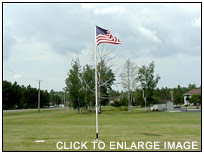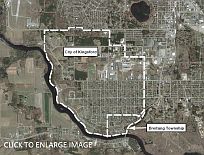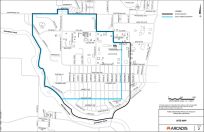 Active Vent: The safe venting or release of gas-phase methane from below the ground surface into the atmosphere where it naturally dissipates. Active venting requires the use of a mechanically driven system (soil vapor extraction system) that applies a vacuum to the soil below the ground surface to remove gas-phase methane.
Active Vent: The safe venting or release of gas-phase methane from below the ground surface into the atmosphere where it naturally dissipates. Active venting requires the use of a mechanically driven system (soil vapor extraction system) that applies a vacuum to the soil below the ground surface to remove gas-phase methane.
Breitung Township Fire Department (BTFD): Local fire department for Breitung Township that is assisting Ford and Kingsford Products with the methane program.
Constituent: A chemical compound that is being addressed, evaluated, or monitored at the Kingsford Site.
Geology: A science dealing with the history of the earth, conditions below the ground surface, rocks, and other features.
Hydrogeology: A science dealing with the flow of water below the ground surface.
Interim Response Action Plan (IRAP): A plan based on technical information that is developed to address environmental issues in a specific area. The plan also may be incorporated into a final, overall site remedy.
Kingsford Public Safety Department (KPSD): Local public safety department for the City of Kingsford that is assisting Ford and Kingsford Products with the methane program.
 Methane detector: A small device, similar in size and operation to a smoke detector, that is placed in the basement or the lowest level of a building to detect for the potential presence of gas-phase methane. Methane detectors are designed to sound long before a safety hazard exists. Methane detector: A small device, similar in size and operation to a smoke detector, that is placed in the basement or the lowest level of a building to detect for the potential presence of gas-phase methane. Methane detectors are designed to sound long before a safety hazard exists.
Michigan Department of Environment, Great Lakes, and Energy (EGLE): The State of Michigan environmental agency.
Remedial Investigation (RI) Work Plan: A plan outlining methods and procedures for investigation and evaluation activities, which provide more information about the environmental conditions of an area. This information is used to formulate an assessment and final plan to appropriately address environmental issues that may be present.
Remedial Investigation (RI) Report: The report submitted to EGLE that discusses the activities of the Remedial Investigation field activities and presents the results of the study for the site.
 Passive Vent: The safe venting, or release, of gas-phase methane from below the groundwater surface into the atmosphere, where it naturally dissipates. Wells/piping installed below groundwater surface allow the gas-phase methane to flow upward by its own pressure and through changes in atmospheric pressure through the piping and flagpoles, where it is released to the atmosphere. Passive Vent: The safe venting, or release, of gas-phase methane from below the groundwater surface into the atmosphere, where it naturally dissipates. Wells/piping installed below groundwater surface allow the gas-phase methane to flow upward by its own pressure and through changes in atmospheric pressure through the piping and flagpoles, where it is released to the atmosphere.
Soil Vapor Extraction (SVE) System: A mechanically driven active vent for gas-phase methane removal that uses a vacuum applied to the soil below the ground surface to remove gas-phase methane.
Engineered Soil Cover: A layer of clean soil sometimes including synthetic liners or fabric installed to cover disposal materials and contaminated soil, which provide a barrier to prevent direct contact with the underlying material.
 Kingsford Site: An area in portions of the City of Kingsford and Breitung Township generally bordered on the north by Woodward Avenue, on the east by Hooper Street, and on the west and south by the Menominee River, where Ford and Kingsford Products have undertaken an extensive investigation of soil and groundwater conditions and are implementing response actions to appropriately address environmental conditions. Kingsford Site: An area in portions of the City of Kingsford and Breitung Township generally bordered on the north by Woodward Avenue, on the east by Hooper Street, and on the west and south by the Menominee River, where Ford and Kingsford Products have undertaken an extensive investigation of soil and groundwater conditions and are implementing response actions to appropriately address environmental conditions.
Response Activity Plan: A plan based on technical information that is developed to address environmental issues in a specific area; replaces IRAP per current EGLE format.
 Kingsford Study Area: The area where the residential and commercial methane programs are implemented. This area has been modified over time based on results of investigation and remedial activities, in accordance with EGLE approval. Kingsford Study Area: The area where the residential and commercial methane programs are implemented. This area has been modified over time based on results of investigation and remedial activities, in accordance with EGLE approval.
United States Environmental Protection Agency (U.S. EPA): The federal agency involved with environmental clean up. U.S. EPA initially was the lead agency working with EGLE to provide oversight for work performed at the Kingsford Site.
|










